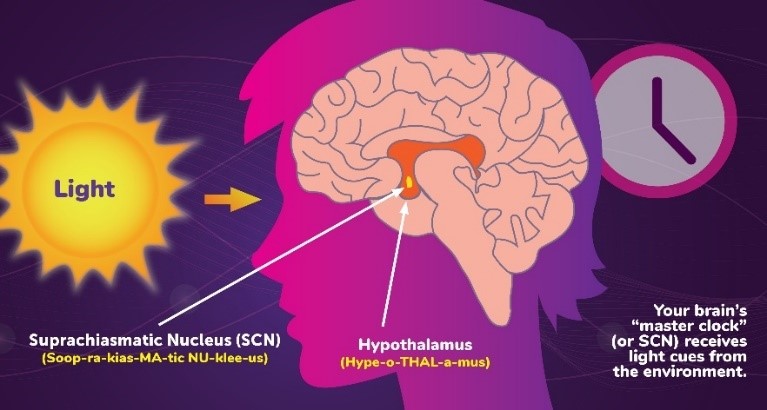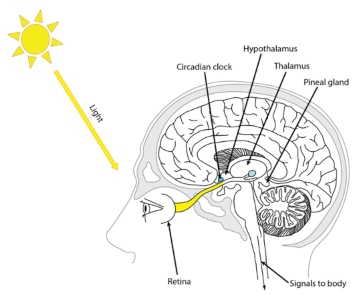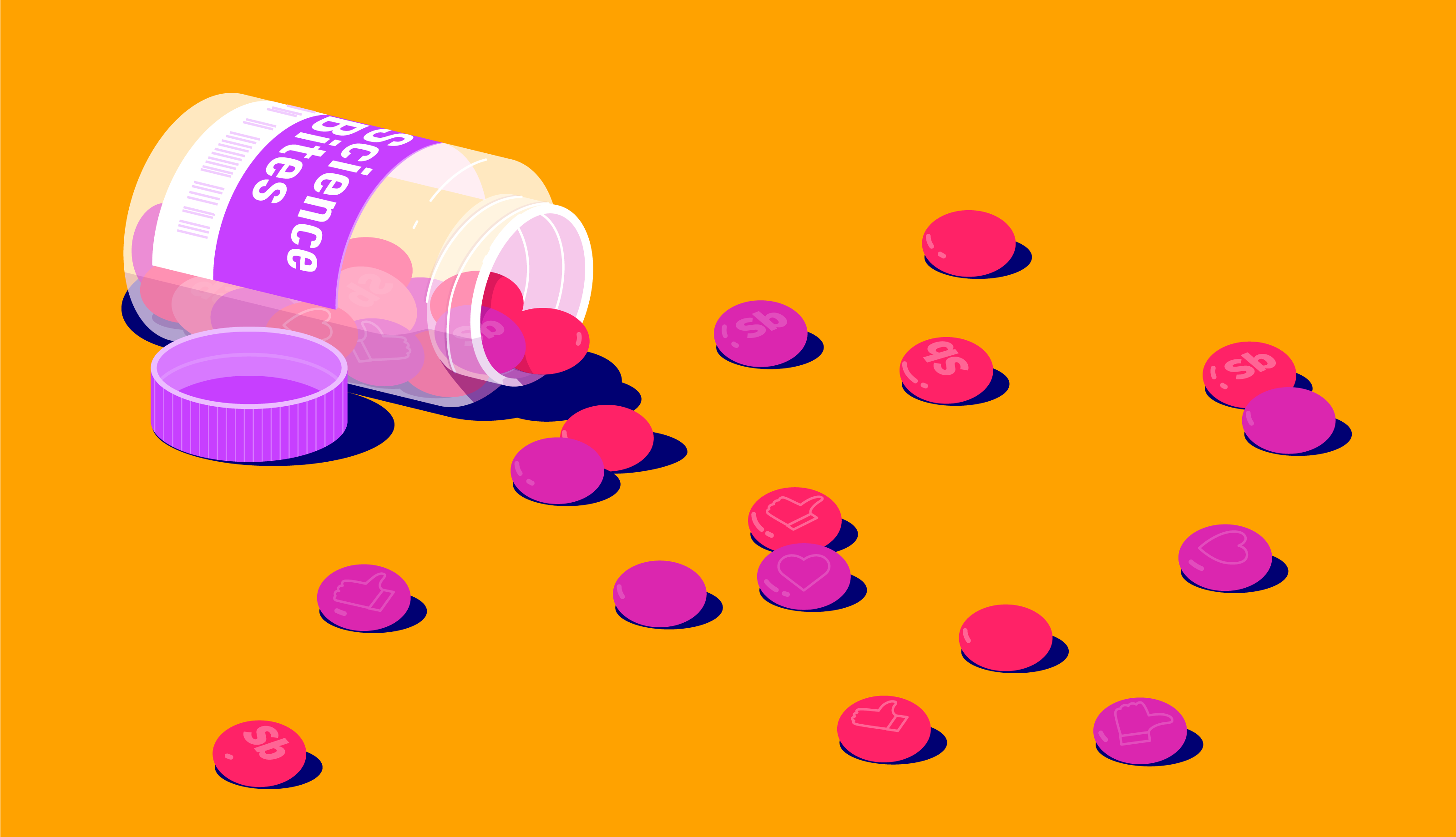Circadian Rhythms – What are circadian rhythms?
What are circadian rhythms?
Circadian rhythms are physical, mental, and behavioral changes that follow a 24-hour cycle. These natural processes respond primarily to light and dark and affect most living things, including animals, plants, and microbes. Chronobiology is the study of circadian rhythms. One example of a light-related circadian rhythm is sleeping at night and being awake during the day. The Average Teen Circadian Cycle image shows the circadian rhythm cycle of a typical teen.
What are biological clocks?
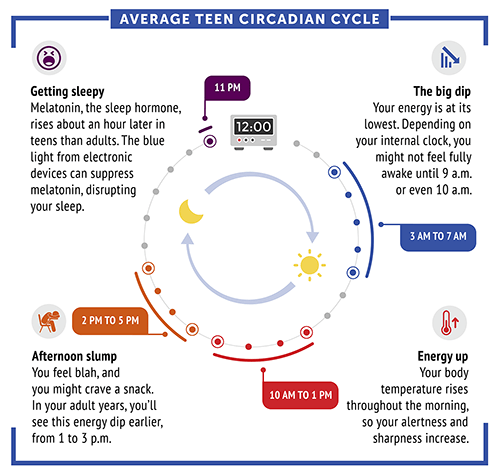
Biological clocks are organisms’ natural timing devices, regulating the cycle of circadian rhythms. They’re composed of specific molecules (proteins) that interact with cells throughout the body. Nearly every tissue and organ contains biological clocks. Researchers have identified similar genes in people, fruit flies, mice, plants, fungi, and several other organisms that make the clocks’ molecular components.
What is the master clock?
A master clock in the brain coordinates all the biological clocks in a living thing, keeping the clocks in sync. In vertebrate animals, including humans, the master clock is a group of about 20,000 nerve cells (neurons) that form a structure called the suprachiasmatic nucleus, or SCN. The SCN is in a part of the brain called the hypothalamus and receives direct input from the eyes.
Does the body make and keep its own circadian rhythms?
Yes, natural factors in your body produce circadian rhythms. For humans, some of the most important genes in this process are the Period and Cryptochrome genes. These genes code for proteins that build up in the cell’s nucleus at night and lessen during the day. Studies in fruit flies suggest that these proteins help activate feelings of wakefulness, alertness, and sleepiness. However, signals from the environment also affect circadian rhythms. For instance, exposure to light at a different time of day can reset when the body turns on Period and Cryptochrome genes.
How do circadian rhythms affect health?
Circadian rhythms can influence important functions in our bodies, such as:
- Hormone release
- Eating habits and digestion
- Body temperature
However, most people notice the effect of circadian rhythms on their sleep patterns. The SCN controls the production of melatonin, a hormone that makes you sleepy. It receives information about incoming light from the optic nerves, which relay information from the eyes to the brain. When there is less light—for example, at night—the SCN tells the brain to make more melatonin so you get drowsy.
Nobel Prize
In 2017, researchers Jeffrey C. Hall, Michael Rosbash, and Michael W. Young won the prestigious Nobel Prize for their circadian rhythms research. By studying fruit flies, which have a very similar genetic makeup to humans, they isolated a gene that helps control the body’s clock. The scientists showed that the gene produces a protein that builds up in cells overnight, then breaks down during the day. This process can affect when you sleep, how sharply your brain functions, and more. All three researchers were funded by NIGMS when these major discoveries were made.
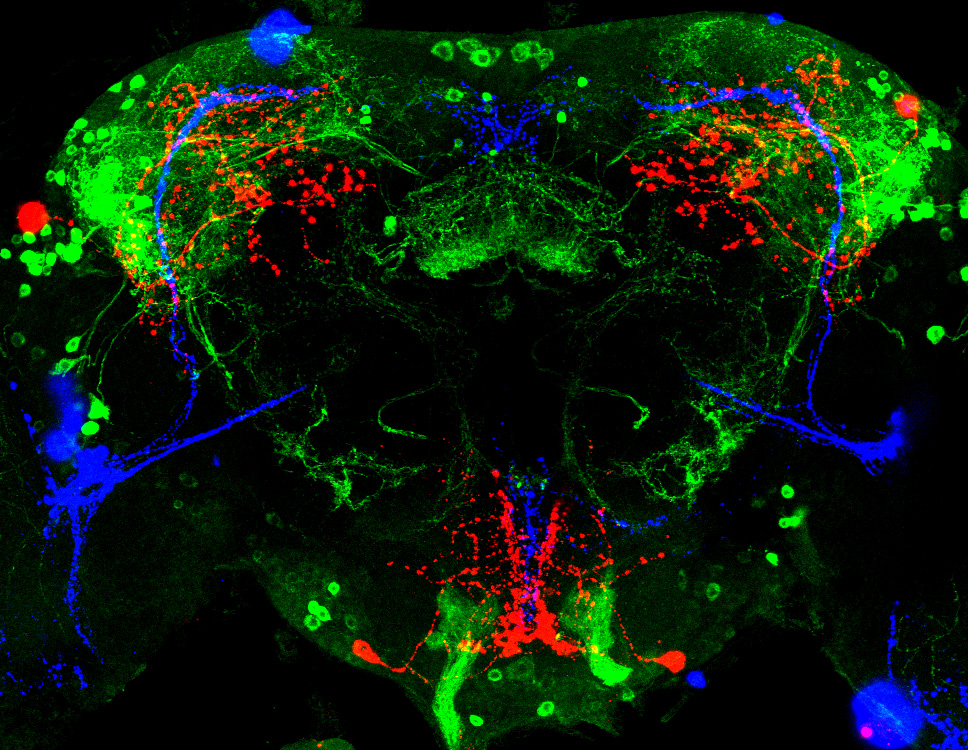

What factors can change circadian rhythms?
Changes in our body and environmental factors can cause our circadian rhythms and the natural light-dark cycle to be out of sync. For example:
- Mutations or changes in certain genes can affect our biological clocks.
- Jet lag or shift work causes changes in the light-dark cycle.
- Light from electronic devices at night can confuse our biological clocks.
These changes can cause sleep disorders, and may lead to other chronic health conditions, such as obesity, diabetes, depression, bipolar disorder, and seasonal affective disorder.
How are circadian rhythms related to jet lag?
When you pass through different time zones, your biological clock will be different from the local time. For example, if you fly east from California to New York, you “lose” 3 hours. When you wake up at 7:00 a.m. on the East Coast, your biological clock is still running on West Coast time, so you feel the way you might at 4:00 a.m. Your biological clock will reset, but it will do so at a different rate. It often takes a few days for your biological clock to align with a new time zone. Adjusting after “gaining” time may be slightly easier than after “losing” time because the brain adjusts differently in the two situations.
How do researchers study circadian rhythms?
Scientists learn about circadian rhythms by studying humans and by using organisms with similar biological clock genes, such as fruit flies and mice. Researchers doing these experiments control the subject’s environment by altering light and dark periods. Then they look for changes in gene activity or other molecular signals. Scientists also study organisms with irregular circadian rhythms to identify which genetic components of biological clocks may be broken.
Understanding what makes biological clocks tick may lead to treatments for jet lag, sleep disorders, obesity, mental health disorders, and other health problems. It can also improve ways for people to adjust to nighttime shift work. Learning more about the genes responsible for circadian rhythms will also help us understand more about the human body.
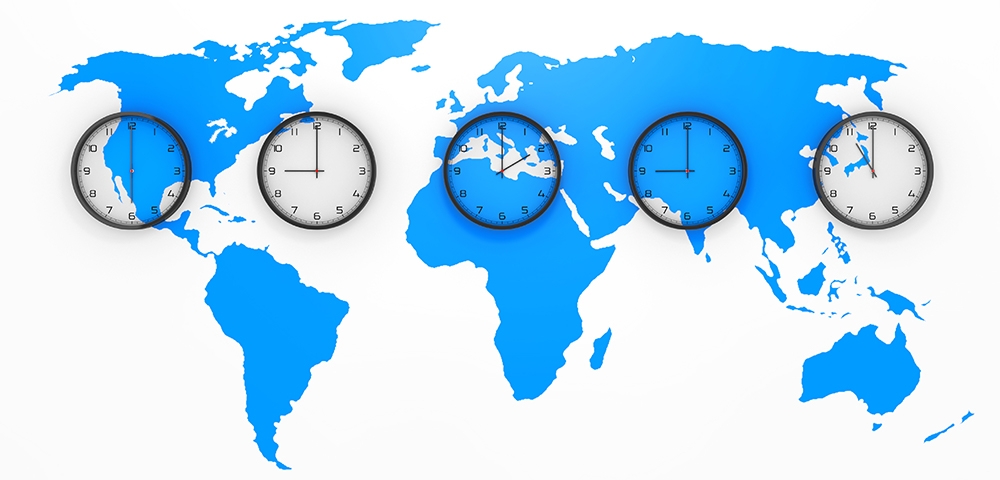
Circadian Rhythm
How Circadian Rhythms Work
About 20,000 nerve cells make up your “master clock,” a part of your brain called the suprachiasmatic nucleus. This structure, which sits inside an area called the hypothalamus, controls your circadian rhythms. While largely guided by your genes and other natural factors inside your body, things in the outside world can also alter them.
Is a Circadian Rhythm the Same As a Biological Clock?
Biological clocks help regulate the timing of bodily processes, including circadian rhythms. A circadian rhythm is an effect of a biological clock, but not all biological clocks are circadian. For instance, plants adjust to changing seasons using a biological clock with timing that is distinct from a 24-hour cycle.
How Does Circadian Rhythm Affect Sleep?
When people talk about circadian rhythm, it’s most often in the context of sleep. The sleep-wake cycle is one of the most clear and critical examples of the importance of circadian rhythms.
During the day, light exposure causes the master clock to send signals that generate alertness Trusted SourceDivision of Sleep Medicine at Harvard Medical SchoolA production of WGBH Educational Foundation and the Harvard Medical School Division of Sleep Medicine.healthysleep.med.harvard.eduand help keep us awake and active. As night falls, the master clock initiates the production of melatonin, a hormone that promotes sleep, and then keeps transmitting signals that help us stay asleep through the night.
In this way, our circadian rhythm aligns our sleep and wakefulness with day and night Trusted SourceDivision of Sleep Medicine at Harvard Medical SchoolA production of WGBH Educational Foundation and the Harvard Medical School Division of Sleep Medicine.healthysleep.med.harvard.eduto create a stable cycle of restorative rest that enables increased daytime activity.
Different Patterns for Different People
You’ve likely noticed that you feel more alert during certain parts of the day and have lower energy at others. This pattern has to do with your “chronotype,” or personal circadian rhythm. They vary from person to person, although they tend to run in families.
Most of the time, people fall into one of two groups:
Early birds: If you find it easy to wake up in the morning and feel you have the most energy early in the day, you’re a morning person or a “lark.” Some research suggests that an early bird’s body clock may run slightly faster than 24 hours.
Circadian Rhythms Out of Sync
Small changes can upset your circadian rhythms. These include:
Extra sleep. Your body clock works best when you stick to a schedule. In an ideal world, you’ll go to sleep and wake up within a half hour of the same time each day, even on weekends.
Travel. When you pass through time zones, you can adjust your watch but not your body clock. It will try to function on the time it is at your home, a problem you may know as jet lag. The more time zones you pass through, the more off you may feel. Your body clock will reset to the new time you’re in, but it can take a few days.
Screen time. Any amount of light signals your brain that it’s time to be up and alert. Even the blue light from your tablet, smartphone, or TV has this effect. To get a good night’s sleep, unplug from all screens 2 to 3 hours before bed. Other artificial light can have the same effect, so turn off hallway lights and face your alarm clock away from you. If you’re bothered by light outside your home, put up blackout curtains or use a sleep mask.
Night shifts. If you work nights, you’ll need to sleep during the day. This can be tough since your body is programmed to be awake when it’s light outside. Over time, you can start to have what’s called shift work disorder. You’ll find it hard to stay awake at night, yet struggle to sleep during the day. Naps during the day or your night shift can help.
Your period. Many women notice that they sleep worse before their period starts. This may be due, at least in part, to a change in circadian rhythms. Some studies show that less sleep during this time can reset your body clock and give some relief. Bright daylight or light therapy may also make a difference.
What Does Circadian Rhythm Affect Besides Sleep?
While the sleep-wake cycle is one of the most prominent circadian rhythms, these 24-hour internal clocks play a vital role in virtually all systems of the body Trusted SourceNational Institute of General Medical Sciences (NIGMS) BlogThe NIGMS supports basic research that increases our understanding of biological processes and lays the foundation for advances in disease diagnosis, treatment, and prevention.biobeat.nigms.nih.gov.
Research continues to uncover details about circadian rhythms, but evidence has connected them Trusted SourceNational Library of Medicine, Biotech InformationThe National Center for Biotechnology Information advances science and health by providing access to biomedical and genomic information.pubmed.ncbi.nlm.nih.govto metabolism and weight through the regulation of blood sugar and cholesterol. Circadian rhythms influence mental health as well, including the risk of psychiatric illnesses like depression and bipolar disorder as well as the potential for neurodegenerative diseases Trusted SourceMedline PlusMedlinePlus is an online health information resource for patients and their families and friends.medlineplus.govlike dementia.
There are indications that circadian rhythms have an important influence on the immune system as well as processes of DNA repair that are involved in preventing cancer Trusted SourceNational Library of Medicine, Biotech InformationThe National Center for Biotechnology Information advances science and health by providing access to biomedical and genomic information.pubmed.ncbi.nlm.nih.gov. Early-stage research indicates that circadian cycles can influence the effectiveness of anti-cancer drugs Trusted SourceNational Cancer Institute (NCI)The NCI is the federal government’s principal agency for cancer research and training.cancer.govand that new medications may be able to harness biological clocks to kill cancer cells.
What Happens When Circadian Rhythm Is Off?
When circadian rhythm is thrown off, it means that the body’s systems don’t function optimally.
A disturbed sleep-wake circadian rhythm can give rise to serious sleeping problems. Without the proper signaling from the body’s internal clock, a person can struggle to fall asleep, wake up during the night, or be unable to sleep as long as they want into the morning. Their total sleep can be reduced, and a disrupted circadian rhythm can also mean shallower, fragmented, and lower-quality sleep. source
What Can Disrupt Circadian Rhythm?
Disruptions to circadian rhythm can occur over the short- or long-term. Experts have identified a number of types of circadian rhythm sleep-wake disorders (CRSWD) based on their characteristics and causes.
- Jet Lag Disorder: This occurs when a person crosses multiple time zones in a short period of time and gets its name from the fact that it is often experienced by people who take intercontinental flights. Until a person’s circadian rhythm can acclimate to the day-night cycle of their new location, they are likely to suffer sleeping problems and fatigue from jet lag.
- Shift Work Disorder: Work obligations can cause major disruptions in a person’s circadian rhythm. Shift work, which requires having to work through the night and sleep during the day, puts a person’s sleep schedule directly at odds with the local daylight hours.
- Advanced Sleep Phase Disorder: People with this type of disruption find that they get tired early in the evening and wake up very early in the morning. Even if they want to be up later at night or sleep later in the morning, people with an advanced sleep phase disorder usually cannot do so. This disorder is relatively rare, affecting around 1% of people in middle and older age Trusted SourceNational Library of Medicine, Biotech InformationThe National Center for Biotechnology Information advances science and health by providing access to biomedical and genomic information.pubmed.ncbi.nlm.nih.gov, and occurs more frequently in older adults. In some cases, advanced sleep phase disorder may be related to an inherited genetic cause.
- Delayed Sleep Phase Disorder: This type of circadian rhythm disruption is associated with “night owls” who stay up late at night and sleep in late in the morning. It is rare among the general population — affecting just 1 or 2 people out of every 1,000 — but impacts up to 16% of teens. The exact cause is unknown but may be related to genetics, underlying physical conditions, and a person’s behavior.
- Non-24 Hour Sleep Wake Disorder: This condition occurs primarily in people who are blind Trusted SourceNational Organization for Rare Disorders (NORD)NORD is a patient advocacy organization dedicated to individuals with rare diseases and the organizations that serve them.rarediseases.organd are not able to receive light-based cues for their circadian rhythm. Their body still follows a 24-hour cycle, but their sleeping hours constantly shift backward by minutes or hours at a time.
- Irregular Sleep-Wake Rhythm Disorder: People with this rare disorder have no consistent pattern to their sleep and may have many naps or short sleeping periods throughout a 24-hour day. It is frequently connected to conditions that affect the brain Trusted SourceNational Library of Medicine, Biotech InformationThe National Center for Biotechnology Information advances science and health by providing access to biomedical and genomic information.pubmed.ncbi.nlm.nih.gov, such as dementia or traumatic brain injury, that limit the proper functioning of the master clock in the hypothalamus.
As this list demonstrates, there are diverse causes of circadian rhythm disorders. Some circadian disruptions are related to individual behavior, such as for travel or work, that puts sleep schedules out of whack with normal daylight exposure. Other disorders stem from an underlying issue that causes an inability to receive or process environmental cues that regulate the body’s master clock. In certain situations, genetic causes may be involved, or the cause may remain unknown.
How To Maintain a Healthy Circadian Rhythm
While we don’t have full control over our circadian rhythm, there are healthy sleep tips that can be taken to try to better entrain our 24-hour sleep cycles.
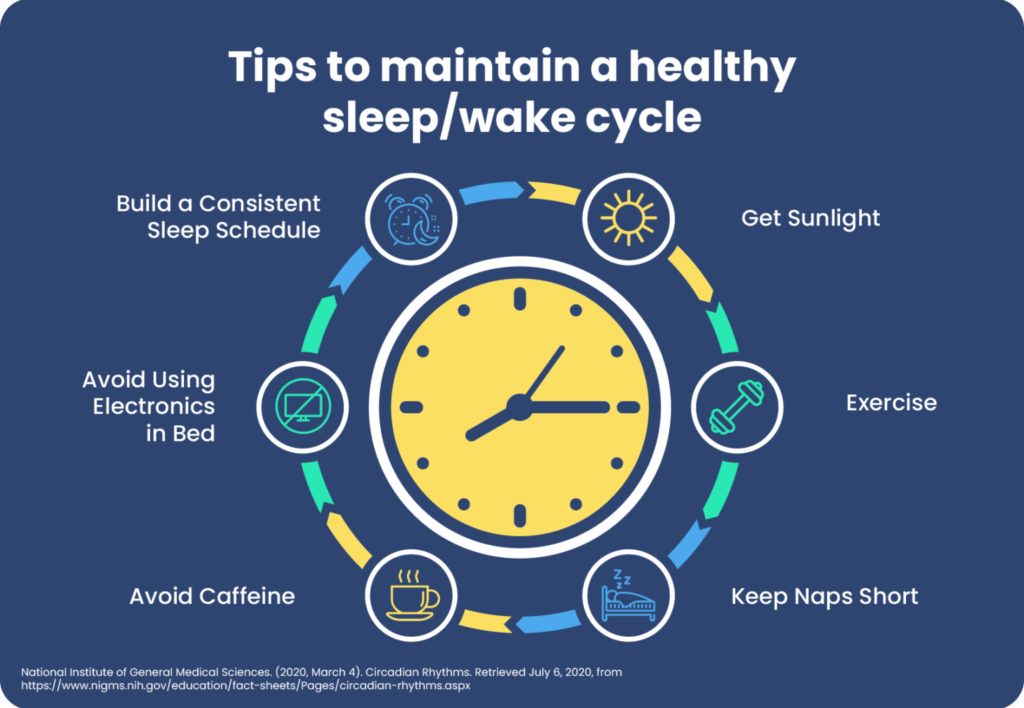
- Seek out sun: Exposure to natural light, especially early in the day, helps reinforce the strongest circadian cue.
- Follow a consistent sleep schedule: Varying your bedtime or morning wake-up time can hinder your body’s ability to adjust to a stable circadian rhythm.
- Get daily exercise: Activity during the day can support your internal clock and help make it easier to fall asleep at night.
- Avoid caffeine: Stimulants like caffeine can keep you awake and throw off the natural balance between sleep and wakefulness. Everyone is different, but if you’re having trouble sleeping, you should avoid caffeine after noon.
- Limit light before bed: Artificial light exposure at night can interfere with circadian rhythm. Experts advise dimming the lights and putting down electronic devices in the lead-up to bedtime and keeping electronics out of the bedroom and away from your mattress.
- Keep naps short and early in the afternoon: Late and long naps can push back your bedtime and throw your sleep schedule off-kilter.
These steps to improve sleep hygiene can be an important part of supporting a healthy circadian rhythm, but other steps may be necessary depending on the situation. If you have persistent or severe sleeping problems, daytime drowsiness, and/or a problematic sleep schedule, it’s important to talk with a doctor who can best diagnose the cause and offer the most appropriate treatment.
-
- Daylight Saving Time Affects Mortality Patterns in European Countries
November 14, 2022 – Analysis of the impact of daylight saving time on people in 16 European countries from 1998 to 2012 shows a decrease in mortality in the spring and an increase in the fall in the two weeks after each daylight saving time change.
- Daylight Saving Time Affects Mortality Patterns in European Countries
-
- Bill to Make Daylight Saving Time Permanent Stuck in House
November 4, 2022 – The U.S. Senate passed legislation in March to make daylight saving time permanent, but the Sunshine Protection Act of 2021 is still stalled in the House of Representatives.
- Bill to Make Daylight Saving Time Permanent Stuck in House
- Sleep Experts Advocate for Permanent Standard Time
Listed news articles do not represent the opinion of Good Shepherd Media and are provided for informational purposes only.
Circadian Rhythm: What Is It And How To Reset Your Body Clock?
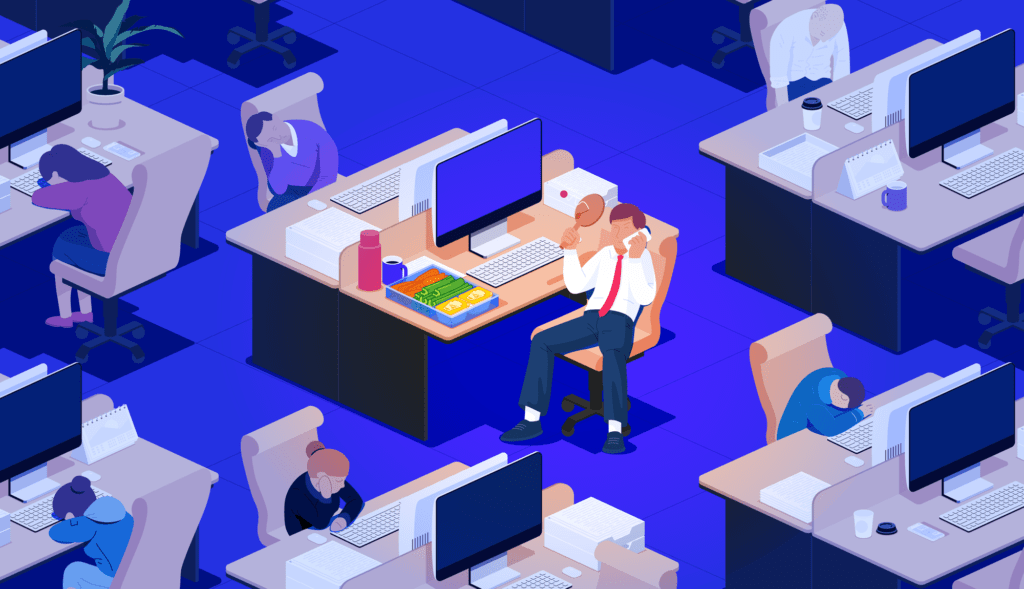
Humans have clock genes that make the body tick like a well-oiled machine. Learn about your circadian rhythm and how it affects your health and disease risks.
A circadian rhythm is a 24-hour biological clock that affects your sleep, digestion, and metabolism. When your circadian rhythm is disrupted, it can even increase your disease risks.
The circadian rhythm is a body clock that organises all the biological processes necessary for life. It is dictated by clock genes that trigger essential metabolic activities, like storing energy, transporting oxygen, getting rid of waste, and releasing hormones and neurotransmitters.
Table of contents
- What is a circadian rhythm?
- How the circadian cycle works
- Do you need to reset your body clock?
- Circadian rhythm and health
- How to fix your sleep schedule
Even though you can’t see or feel this clock, circadian health is essential for your health and wellbeing. In this article, you’ll discover what happens when the cycle rhythm is disrupted, how to reset your body clock, and how to fix your sleep schedule.
What is a circadian rhythm?
The circadian rhythm is a 24-hour clock that dictates millions of invisible metabolic processes that keep the body alive. It determines digestive rhythms, fat burning and fat storage, sleeping patterns, and much more. This biological rhythm is run by clock genes that signal when each process should take place.
Going to bed late, playing with your phone at midnight, eating late in the evening, and working night shifts are all factors that can shift your circadian cycle. Scientific evidence now indicates that circadian rhythm disruptions are associated with serious, but preventable, chronic diseases like diabetes type II, heart disease, obesity, stroke, and cancers.
How the circadian cycle works
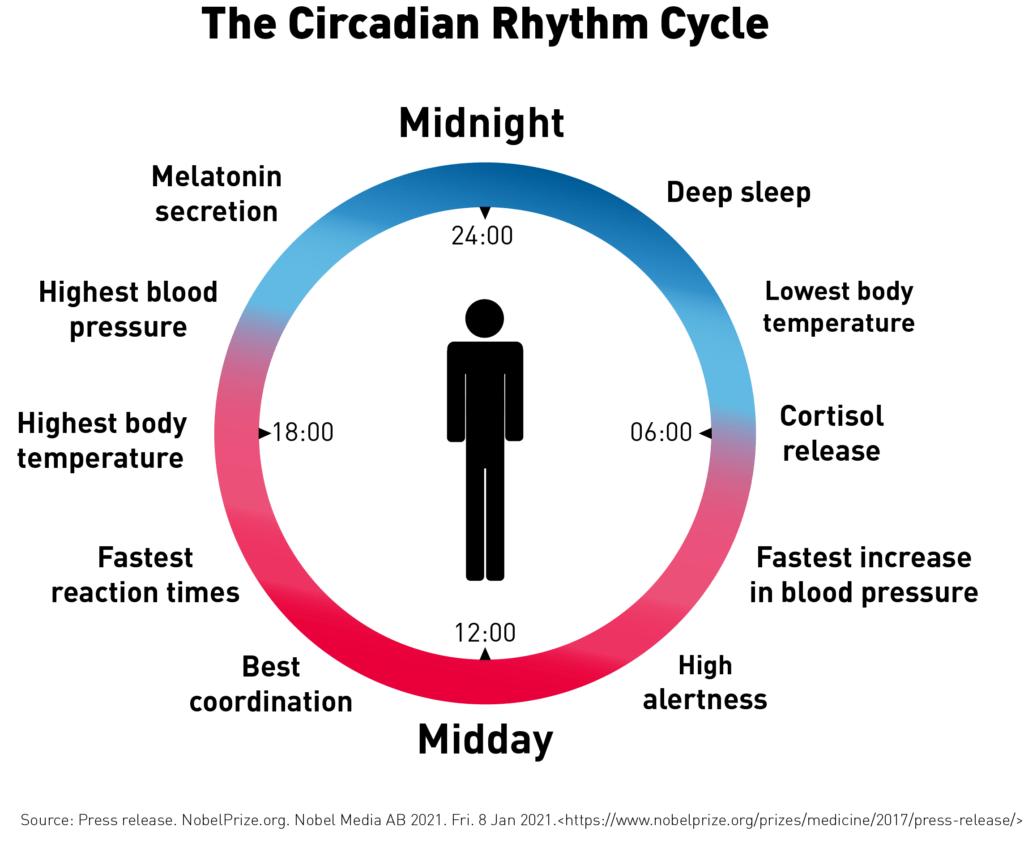
The circadian rhythm is made up of a set of clocks and a central “master clock”, called the suprachiasmatic nucleus (SCN). The SCN is located in the hypothalamus, the part of the brain responsible for regulating stress, reproduction, and growth hormones. It also indirectly impacts sleep hormones.
The body’s clock contains about 20,000 cells, which are located just above the intersection of the optic nerves. The cycle rhythm is set by signals from special melanopsin cells in the retina in response to light exposure. Blue light (from bright daylight, phone screens, and TVs) has the strongest effect on melanopsin receptors, followed by green and red light.
Body clock genes have been discovered in nearly every organ of the human body. These genes turn on and off at predictable times, switching on and shutting down the production of proteins that perform essential functions within the body’s cells.
Sleep washes Alzheimer’s particles from the brain
Interestingly, studies show that blind mice and blind people still have active melanopsin receptors that regulate their biological clock. This helps to explain why patients suffering from blindness can “sense” light, even if they can’t see it.
☝Find out more about your genes☝ Take the Atlas DNA Test to explore how your genetic make-up affects your health and wellbeing.
Do you need a body clock reset?
Sleeping at irregular times, using devices, eating late at night, and other pernicious habits displace the cycle rhythm. When a person’s biological cycle isn’t on schedule, it causes a wide range of minor health issues that can affect everyday life.
Low energy, mood swings, food cravings, weak immunity, and having trouble losing weight are common side effects of circadian disruption according to Professor Satchidananda Panda, author of the Circadian Code.
| Area | Common problems |
|---|---|
| Sleep | Difficulty falling or staying asleep, sleeping too much |
| Weight | Weight gain, inability to lose weight |
| Vitality | Low energy, reliance on caffeinated products |
| Diet | Late-night food cravings, stomach cramps & indigestion |
| Mood | Depression, emotional outbursts & irrational anger |
| Immunity | Weak immune system, frequent illness & infections |
Circadian rhythm and digestion
The digestive system secretes the most gastric juices, enzymes, and hormones in the first half of the day. This activity reduces as the afternoon progresses into evening. These molecules are all essential for healthy digestion, which is why eating late at night can cause indigestion.
Circadian rhythm and sleep

At night, the circadian rhythm is focused on putting the body to sleep, removing waste products, and repairing tissues from the wear-and-tear of daytime activities. In fact, sleep is the only time for the brain to remove the waste products of chemical reactions.
When you mess with your sleep schedule, or deprive yourself of sleep, you impair the brain’s ability to operate at maximum efficiency.
Circadian rhythm and disease
Living out of sync with the body’s circadian rhythm over the short and long term is associated with serious, chronic, and preventable diseases that affect the body’s metabolism, according to a 2016 systematic review on the “Interaction between circadian rhythms and stress”.
In one referenced study, the human participants with impaired circadian rhythm function had “higher blood glucose and insulin levels as well as elevated blood pressure, which are markers for metabolic and cardiovascular disease.”
The study’s summary of its effects on night shift workers demonstrated that such professionals have “a higher incidence of obesity, diabetes type II and related metabolic disturbances along with hypertension (high blood pressure), coronary heart disease, and ischemic stroke”.
How to fix your sleep schedule
Light and darkness are the main determinants in circadian rhythm. When daylight or screen light is detected by your eyes, it sends signals to the suprachiasmatic nucleus, which regulates all the clock genes in your body.
To reset your body clock, you need to put yourself on a schedule that respects your body’s metabolic rhythm. While this may be impossible for night shift workers, it is an achievable goal for people with day jobs.
- Go to bed and get up at the same time every day.
- Turn off TV screens, phones, and tablets 1-2 hours before bed.
- Eat your biggest meal early in the day when digestive juices are highest.
- Stay away from caffeinated beverages in the afternoon and evening.
- Cut down on alcohol at night because it affects sleep quality.
- Stop eating at least 3 hours before bed to avoid indigestion.
- Get blackout curtains and dim light bulbs for your bedroom.
- [Sachin Panda, The Circadian Code]
- Koch C.E. et al., Interaction between Circadian Rhythm and Stress 2017
- S. Panda et al., Coordinated Transcription of Key Pathways in the Mouse by the Circadian Clock
- Blue light has a dark side
- Circadian rhythms fact sheet
- Thomas C. Erren et al., Shift Work and Cancer 2010
- Bennett J.E. et al. (2018). NCD Countdown 2030: worldwide trends in non-communicable disease mortality and progress towards Sustainable Development Goal target 3.4

